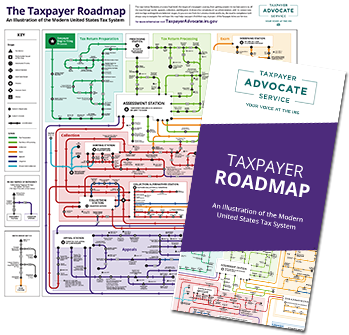Taxpayer Receives and Gathers Tax Information
View our interactive tax map to see where you are in the tax process. It could help you navigate your way through the IRS.
View our interactive tax map to see where you are in the tax process. It could help you navigate your way through the IRS.

Before you sit down and start preparing your tax return or before you meet with a tax return preparer, gather all your tax records. These records must support the income, expenses, and credits you report. Having all the needed documents on hand before you start to prepare your return helps you to file a complete and accurate tax return. If you are using a tax return preparer, it is important that you share all necessary documents with the preparer. If the IRS subsequently tries to penalize you for a position taken on your return, you may be able to avoid the penalty if you can show your reliance on the preparer was reasonable. But that analysis will be governed in part by whether you provided necessary and accurate information to the preparer. In addition, the IRS could penalize you for negligence, which includes failure to keep adequate books and records.
In advance of preparing a return includes acquiring year-end Forms W-2 from employers, Forms 1099 from banks and other payers, other income documents, documentation of virtual currency transactions, and Forms 1095-A from the Marketplace for those claiming the Premium Tax Credit. You should confirm that each employer, bank or other payer has your current mailing address. Typically, these forms start arriving by mail in January. Review them carefully and, if any of the information shown is inaccurate, contact the employer, bank, or payer right away for a correction.
To gathering your records to prepare a return, well-organized records make it easier to provide answers if your return is selected for examination or if you receive an IRS notice.
View your account information to see information from your most recently filed tax return.
Notify the IRS if your address changes and notify the Social Security Administration of a legal name change to avoid a delay in processing your tax return
Get Help topics
Browse common tax issues and situations at TAS Get Help
If you still need help
The Taxpayer Advocate Service is an independent organization within the IRS that helps taxpayers and protects taxpayers’ rights. We can offer you help if your tax problem is causing a financial difficulty, you’ve tried and been unable to resolve your issue with the IRS, or you believe an IRS system, process, or procedure just isn’t working as it should. If you qualify for our assistance, which is always free, we will do everything possible to help you.
Visit dev.taxpayeradvocate.irs.gov or call ![]() 1-877-777-4778.
1-877-777-4778.
Low Income Taxpayer Clinics (LITCs) are independent from the IRS and TAS. LITCs represent individuals whose income is below a certain level and who need to resolve tax problems with the IRS. LITCs can represent taxpayers in audits, appeals, and tax collection disputes before the IRS and in court. In addition, LITCs can provide information about taxpayer rights and responsibilities in different languages for individuals who speak English as a second language. Services are offered for free or a small fee. For more information or to find an LITC near you, see the LITC page on the TAS website or Publication 4134, Low Income Taxpayer Clinic List.
Taxpayer Receives and Gathers Tax Information